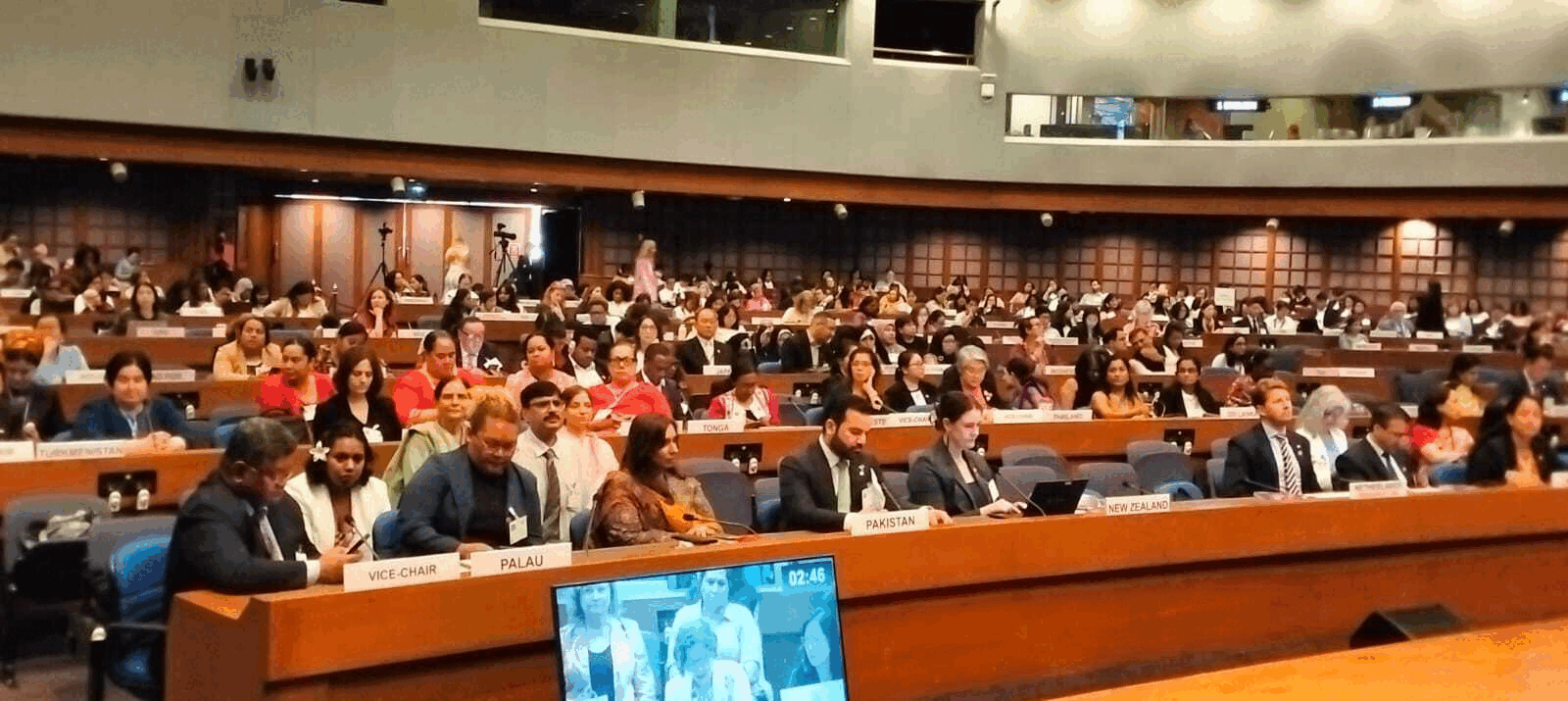Pakistan Builds on Beijing Platform to Foster Gender Equality, Climate Resilience
Myra Imran
Bangkok, Thailand: Pakistan has committed to enhancing digital access, creating economic opportunities for women, and ensuring gender-responsive budgeting at the Asia-Pacific Ministerial Conference on the Beijing+30 Review, which kicked off in Bangkok on Tuesday.
The country also called for regional cooperation to build resilience against climate change.
Leading Pakistan’s delegation at the conference, Advisor for Law and Justice Aqeel Malik reiterated the nation’s dedication to gender equality, emphasizing that while progress has been made in empowering women, true equality remains a distant goal.
“We celebrate our achievements, but we recognize that gender equality is a journey still underway,” Malik said.
He reaffirmed Pakistan’s commitment to the Beijing Platform for Action, pledging to continue working towards a future where all women and girls can realize their full potential.
Malik highlighted several initiatives that underscore Pakistan’s commitment to gender equality, including constitutional provisions that ensure non-discrimination (Articles 25, 26, 27, and 34). These principles have laid the groundwork for the National Gender Policy Framework 2022 and Vision 2025, which prioritize women’s roles in governance, economic development, education, and security. The Advisor also spoke about several key programs aimed at empowering women economically, such as the Prime Minister’s Women Empowerment Initiative, which offers interest-free loans, skills training, and daycare facilities for working women.
The Advisor also spoke about several key programs aimed at empowering women economically, such as the Prime Minister’s Women Empowerment Initiative, which offers interest-free loans, skills training, and daycare facilities for working women.
Additionally, initiatives like the Women Pink Bus service and the Women on Wheels Project are designed to improve women’s mobility, enabling greater participation in the workforce.
On financial empowerment, Malik cited the Banking and Equality initiative and the Revolving Financing Facility for Women Entrepreneurs, as well as the National Financial Inclusion Strategy 2023, which has surpassed its target of 20 million active bank accounts for women. The Benazir Income Support Program, with an allocation of Rs. 200 billion, also continues to play a crucial role in supporting women’s welfare.
Malik also addressed political participation, mentioning the reserved seats for women in Parliament and the prominent roles held by women in government, including Shaheed Benazir Bhutto, the first female Prime Minister of the Islamic World, and Maryam Nawaz, the current Chief Minister of Punjab.
He highlighted that nearly 20 percent of district judges in Pakistan are women and noted the landmark appointments of Justice Ayesha Malik and Justice Musarat Hilali to the Supreme Court.
On the international stage, Malik emphasized Pakistan’s leadership in peacekeeping, with over 500 female peacekeepers deployed, surpassing the UN’s target for female staff officers. He also underscored the nation’s firm commitment to addressing violence against women through a robust legislative and institutional framework.
The three-day conference, which marks a pivotal moment ahead of the 30th anniversary of the 1995 Beijing Declaration, has brought together over 1,200 delegates from governments, civil society, and youth groups. The gathering reflects a renewed commitment to achieving gender equality in the region.
In her opening remarks, ESCAP Executive Secretary Armida Salsiah Alisjahbana emphasized the importance of positioning women and girls to thrive in emerging opportunities, particularly in digital transformation and climate action.
“These are the megatrends of our time, and without a focus on gender equality, they risk deepening inequalities,” she warned.
Sima Bahous, Executive Director of UN Women, called on participants to accelerate the implementation of the Beijing Platform, ensuring women and girls remain central to economic, social, and political agendas.
She also launched a new report, Charting New Paths for Gender Equality and Empowerment, which outlines strategies and solutions for overcoming gender inequality across sectors such as poverty reduction, decent work, and freedom from gender-based violence.
As the Asia-Pacific region looks ahead, the conference serves as a crucial moment to renew political will and public engagement in the quest for gender equality, empowering women and girls to shape a more just and resilient future.

Comments are closed.